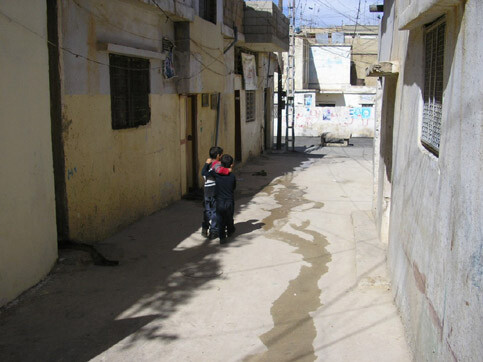European Commission Humanitarian Aid Office (ECHO) 7 December 2004

Camp space is insufficient, and environmental conditions - lack of public electricity, over-crowding, sewage-seepage, polluted drinking water - are hazardous to health, particularly of children. (Arjan El Fassed)
BRUSSELS — The European Commission has allocated a further €7 million in humanitarian aid for people made vulnerable by the Middle East crisis. The aid will provide access to food, clean water and sanitation for the poorest Palestinians living on the West Bank and in the Gaza Strip. There is also a major funding component to help rehabilitate the shelters of thousands of Palestinian refugees in Jordan, Lebanon and Syria. The aid will be channelled through ECHO, the Commission’s humanitarian aid department. It brings the Commission’s humanitarian assistance to victims of the Middle East crisis to €37 million for 2004.
Louis Michel, Commissioner for Development and Humanitarian Aid, said: “As the political process in the Middle East may well enter a new phase, it is important not to forget the humanitarian consequences of the crisis and to continue assisting and protecting those who grow more vulnerable every day. Palestinian refugees who have been in neighbouring countries for over 50 years are often forgotten by aid agencies and donors. We must ensure they live in decent conditions. In the occupied Palestinian territory, living conditions are deteriorating for an increasing share of the population, as a direct result of the conflict.”
The latest aid package includes food aid for 12,000 Bedouin families in the Gaza Strip. Wells and irrigation systems will be rehabilitated for the benefit of 5,000 farmers whose assets were destroyed during military operations. In areas affected by the West Bank barrier, rehabilitated water tanks and sewage treatment systems will serve 8,000 people. Actions aimed at protecting civilians from violence by all parties to the conflict will also be supported, in conformity with the 4th Geneva Convention. Meanwhile, the shelters of 4,000 refugees in Jordan, Lebanon and Syria will be rehabilitated.
These activities will complement those funded through decisions adopted earlier this year, that have benefited almost a million needy Palestinians. The Commission’s humanitarian assistance to the Palestinians since the start of the Intifada amounts to €155 million, making it one of the largest aid donors in the region.
According to the United Nations, 2004 has seen the worst levels of destruction of the four years of Intifada in the territories. The humanitarian situation in Gaza has sharply deteriorated. Infrastructure and home demolitions, intensified movement restrictions and escalating conflict are the primary causes. In the West Bank increasing numbers of people are prevented by the “security barrier” from accessing healthcare, education, water resources and the means to earn their living. About 2.2 million Palestinians survive on less than $2 (€1.54) per day.
Related Links